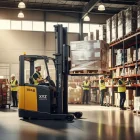When it comes to managing a warehouse or construction site, forklifts play a crucial role in keeping operations smooth and efficient. However, like any piece of heavy machinery, forklifts can encounter issues that require timely repairs. Understanding common problems and knowing how to address them can save you time and money. In this article, we’ll explore common forklift issues, provide solutions, and discuss the importance of regular maintenance to avoid costly downtime.
Understanding Forklift Parts and Their Functionality
Forklifts are complex machines with numerous components that must work in harmony. Knowing the essential parts and their functions helps in diagnosing issues quickly.
Key Forklift Components
-
Engine/Power Source: The heart of the forklift, responsible for powering the machine.
-
Hydraulic System: Controls the lifting and lowering of loads.
-
Mast: The vertical assembly that lifts and lowers the load.
-
Carriage: The component that supports and moves the forks or other attachments.
-
Forks: The extensions that carry loads.
-
Counterweight: Balances the forklift to prevent tipping.
-
Tyres: Provide mobility and support.
Understanding these parts is crucial when troubleshooting issues or performing maintenance.
Common Forklift Issues and How to Fix Them
Engine Problems
Issue: Difficulty Starting
Symptoms: The forklift engine cranks but does not start.
Causes: Could be due to a dead battery, a faulty ignition switch, or fuel system issues.
Solution: Start by checking the battery charge and connections. If the battery is fine, inspect the ignition switch for any damage. If needed, consult a professional to check the fuel system.
Issue: Overheating Engine
Symptoms: The engine temperature rises quickly or overheats during operation.
Causes: Low coolant levels, faulty thermostat, or clogged radiator.
Solution: Check coolant levels and refill if necessary. Inspect the radiator for blockages and clean it. If the problem persists, consider replacing the thermostat.
Hydraulic System Failures
Issue: Hydraulic Leaks
Symptoms: Fluid puddles under the forklift, reduced lifting power.
Causes: Damaged hydraulic hoses, loose fittings, or worn seals.
Solution: Identify the source of the leak and replace damaged hoses or seals. Ensure all fittings are tightened.
Issue: Inconsistent Lifting
Symptoms: Jerky or slow lifting and lowering of the load.
Causes: Air in the hydraulic system, low fluid levels, or a failing pump.
Solution: Bleed the hydraulic system to remove air, check fluid levels, and refill if necessary. If the issue remains, have the pump inspected by a professional.
Tyre Wear and Damage
Issue: Uneven Tyre Wear
Symptoms: Tyres wear out more on one side.
Causes: Misaligned wheels, incorrect tyre pressure, or imbalanced loads.
Solution: Regularly check and adjust tyre pressure. Ensure loads are balanced during operation. If necessary, have the wheels aligned by a professional.
Issue: Tyre Damage
Symptoms: Visible cracks, punctures, or chunks missing from tyres.
Causes: Rough surfaces, debris, or improper tyre type for the environment.
Solution: Replace damaged tyres with those suited for your work environment. Regularly inspect tyres for signs of wear and damage.
Electrical System Issues
Issue: Faulty Lights and Indicators
Symptoms: Non-functioning headlights, brake lights, or warning indicators.
Causes: Blown fuses, burnt-out bulbs, or wiring issues.
Solution: Check and replace any blown fuses or burnt-out bulbs. Inspect wiring for any damage and repair as needed.
The Importance of Regular Forklift Maintenance
Regular maintenance is essential to keep your forklift operating efficiently and to prevent breakdowns. Here are some key maintenance practices:
Routine Inspections
Perform daily inspections before using the forklift. Check fluid levels, tyre pressure, and look for any visible damage. Regular inspections help catch issues early before they become major problems.
Scheduled Servicing
Follow the manufacturer’s recommendations for servicing. Regular servicing includes oil changes, filter replacements, and thorough inspections by a professional technician.
Training and Safety
Ensure that all operators are properly trained in the safe use of forklifts. Educate them on how to conduct daily checks and recognise signs of potential issues.
Finding Reliable Forklift Repairs in Sydney
When it comes to forklift repairs in Sydney, choosing a reliable service provider is crucial. Look for companies that offer:
-
Experienced Technicians: Ensure they have skilled technicians familiar with a range of forklift models.
-
Comprehensive Services: Choose providers that offer a full suite of services, including emergency repairs, routine maintenance, and parts replacement.
-
Quick Response Times: Timely repairs minimise downtime and keep your operations running smoothly.
Conclusion
Forklifts are essential tools in many industries, and keeping them in good working condition is vital. By understanding common issues and performing regular maintenance, you can extend the life of your forklifts and ensure they operate efficiently. When repairs are needed, rely on experienced professionals who specialise in Forklift Repairs in Sydney to get your forklifts back in action quickly. With these practices in place, your operations will continue running without a hitch, saving you time and money in the long run.




